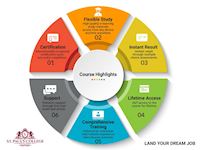Accountancy Diploma Level 3 - FREE Student ID Card -*Exclusive Christmas Offer*
CPD & IAO approved training with tutor support I 60+ Modules I Lifetime Access
St. Pauls College
Summary
- Tutor is available to students
Overview
Benefits of taking this Accountancy Diploma Level 3:
Certification: Internationally recognised certification upon successful completion.
Free Student ID: Get thousands of discounts at many places including cinemas, gym, local restaurants.
Flexible Study: High quality e-learning study materials, access from any device anytime anywhere
Instant Result: Instant result through multiple choice assessments
Lifetime Access: 24/7 access to the course for lifetime
Comprehensive Training: Delivered by instructors with industry experience, video lessons and texts.
Support: Premium support through live chat, email and phone
If you are interested in career advancement and taking benefit of the opportunities that the accountancy profession has to offer, then you are in luck.
With the help of this Accountancy Diploma Level 3 course, you will develop your professional accounting knowledge and gain essential improvement of professional knowledge and skills including the accountancy fundamentals to inscribe complicated accounting issues, financial reporting and take charge for planning and growing spheres of activity that are worthy to underpin corporeality emendation. Moreover, you will gain an understanding of varying perspectives, approaches, principles and the theories relating to accountancy.
Study this course in your own time and at your own pace for a recognised qualification that could transform your career prospects for life.
*Student ID Card benefits*
- Use this as your official student identification.
- Get special discounts on further purchases at St. Pauls College.
- Thousands of UK discounts at many places including cinema, gym, libraries, local restaurants and many more (where accepted).
Course media
Description
What will you learn:
The Accountancy Diploma Level 3 Course consists of 68 mandatory modules, covering
Module 01
- Getting the Facts Straight
- The Accounting Cycle
- The Key Reports
- A Review of Financial Terms
- Understanding Debits and Credits
- Your Financial Analysis Toolbox
- Identifying High and Low Risk Companies
- The Basics of Budgeting
- Working Smarter
Module 02
- Professional Bookkeeper
- Defining a Business
- Ethics in Accounting
- Generally Accepted Accounting Principles (GAAP)
- The Accounting Equation
- Transactions
- Financial Statements
- The Accounting Equation and Transactions
- Double-Entry System
- Transactions – Journalizing
- Journal Entries
- Posting Entries
- The Trial Balance
- Finding Errors Using Horizontal Analysis
- Horizontal Trend : Balance Sheet
- Horizontal Trend: Income Statement
- The Purpose of the Adjusting Process
- Adjusting Entries – Prepaid Expenses
- Adjusting Entries – Accrued Revenues
- Adjusting Entries – Depreciation Expense
- Adjustment Summary – Review
- Vertical Analysis
- Preparing a Worksheet
- The Income Statement
- Financial Statements – Definitions
- Temporary vs. Permanent Accounts
- Accounting Cycle Illustrated – Steps 1-5
- Accounting Cycle Illustrated – Steps 6-10
- Fiscal Year
- Spreadsheet Exercise – Steps 1-4
- Spreadsheet Exercise – Steps 5-7
Module 3
- Module One – Introduction
- Module Two – Basic Terminology
- Module Three – Basic Terminology (II)
- Module Four – Accounting Methods
- Module Five – Keeping Track of Your Business
- Module Six – Understanding the Balance Sheet
- Module Seven – Other Financial Statements
- Module Eight – Payroll Accounting Terminology
- Module Nine – End of Period Procedures
- Module Ten – Financial Planning, Budgeting and Control
- Module Eleven – Auditing
- Module Twelve – Wrapping Up
Module 4
- Tax System in the UK
- What Is Payroll?
- Principles Of Payroll Systems
- Confidentiality And Security Of Information
- Effective Payroll Processing
- Increasing Payroll Efficiency
- Risk Management in Payroll
- Time Management
- Personnel Filing
- When Workers Leave Employment
- Hiring Employees
- Paye and Payroll for Employers
- Tell HMRC about a New Employee
- Net And Gross Pay
- Statutory Sick Pay
- Minimum Wage for Different types of Work
Method of Assessment:
Upon conclusion of the course, there's an online multiple-choice quiz assessment, which will determine whether you have passed the course. The test is marked immediately and results are published instantly (60% pass mark).
Certification:
Certificates can be obtained at an additional cost in PDF or in Printed Hardcopy format.
Requirements
There are no academic entry requirements for this course, and it is open to students of all academic backgrounds.
Questions and answers
Currently there are no Q&As for this course. Be the first to ask a question.
Reviews
Currently there are no reviews for this course. Be the first to leave a review.
Legal information
This course is advertised on reed.co.uk by the Course Provider, whose terms and conditions apply. Purchases are made directly from the Course Provider, and as such, content and materials are supplied by the Course Provider directly. Reed is acting as agent and not reseller in relation to this course. Reed's only responsibility is to facilitate your payment for the course. It is your responsibility to review and agree to the Course Provider's terms and conditions and satisfy yourself as to the suitability of the course you intend to purchase. Reed will not have any responsibility for the content of the course and/or associated materials.




